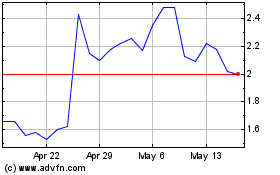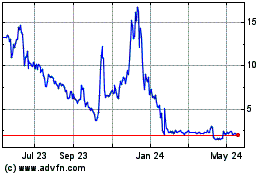Processa Pharmaceuticals Announces Positive Preclinical Data for NGC-Iri
19 August 2024 - 10:00PM

Processa Pharmaceuticals, Inc. (Nasdaq: PCSA) announces positive
data from preclinical studies that support the potential for
NGC-Iri to have improved efficacy and a better side effect profile
compared with the commonly used FDA-approved cancer treatments
irinotecan and Onivyde® (the liposomal formulation of irinotecan).
Next Generation irinotecan (NGC-Iri) is a prodrug of SN-38, which
is the active anticancer metabolite of irinotecan.
In two studies with the human melanoma xenograft
mouse model, the accumulation of SN-38 in the tumor plasma and
other tissues following treatment with NGC-Iri and Onivyde® were
compared with the accumulation following treatment with irinotecan.
One study compared NGC-Iri with irinotecan, and the other compared
Onivyde® with irinotecan. The two studies demonstrated that in mice
that were administered the same amount of SN-38:
- Accumulation of SN-38 in the tumor
compared with other tissues, such as muscle, was greater after
NGC-Iri administration than after irinotecan or Onivyde®
administration, as demonstrated by the tumor-to-muscle ratio of
approximately 200 for NGC-Iri and less than 15 for irinotecan and
Onivyde®;
- More SN-38 accumulated in the tumor
after NGC-Iri administration than after irinotecan or Onivyde®
administration, as demonstrated by the tumor-to-plasma ratio being
approximately 10 for NGC-Iri and less than 7 for irinotecan and
Onivyde®; and
- Less SN-38 accumulated in
non-cancer tissues, such as muscle, after NGC-Iri administration
than after irinotecan or Onivyde® administration, as demonstrated
by the muscle-to-plasma ratio being less than 0.10 for NGC-Iri and
greater than 0.4 for irinotecan and Onivyde®, supporting the
potential for a better NGC-Iri safety profile.
“Many patients are unable to complete their
treatment regimen due to the significant side effects related to
irinotecan and Onivyde®, both of which have black box warnings in
their labels,” stated David Young, PharmD, Ph.D., President of
Research and Development at Processa Pharmaceuticals. “Given the
greater SN-38 exposure in tumors, and less exposure in tissue
outside the tumors, we believe NGC-Iri may have a more favorable
efficacy and side-effect profile, and therefore prove to be an
improved alternative to irinotecan and Onivyde®.”
Processa is currently defining the regulatory
path for NGC-Iri, which includes identifying the target patient
population and the type of cancer to present to the FDA. Once
defined, the Company will provide an update on the regulatory
pathway and timeline.
Irinotecan is a chemotherapy utilized to treat a
variety of solid tumors, including colorectal, pancreatic, ovarian
and lung. It is used as first-line therapy, combined with other
chemotherapy agents, for metastatic colon and rectal cancers and
extensive stage 4 small cell lung cancer (SCLC). In addition,
irinotecan is used as second- or third-line therapy for several
other solid tumors (e.g., metastatic pancreatic, metastatic
gastric, esophageal, breast, relapsed or refractory stage 4 SCLC).
Despite the black box warning for severe side effects, in 2021
Medicare reported a total of more than 1.8 million doses of
irinotecan and Onivyde®.
About NGC-Iri
NGC-Iri is a prodrug of SN-38, the active
molecule in irinotecan and Onivyde®. NGC-Iri is designed to improve
the pharmacokinetic (PK) profile and preferentially distribute
SN-38 to cancer cells over normal cells. A molecule is attached to
SN-38 that is preferentially attracted to the internal electric
field of the cancer cell membrane over normal cells, resulting in
intra-membrane prodrug depots of NGC-Iri.
Animal distribution and PK studies have shown
that NGC-Iri not only preferentially distributes SN-38 to cancer
cells over normal cells, but the half-life of SN-38 is
significantly extended. In addition, SN-38 after NGC-Iri
distributes more to cancer cells and less to other tissues compared
with irinotecan and Onivyde®. Dose-ranging studies in the human
melanoma xenograft mouse model have demonstrated that there is a
wide range of doses that result in similar efficacy but show a
difference in safety.
About Processa Pharmaceuticals, Inc.
Processa is a clinical-stage pharmaceutical
company focused on developing the Next Generation Chemotherapy
(NGC) drugs with improved safety and efficacy. Processa’s NGC drugs
are modifications of existing FDA-approved oncology therapies
resulting in an alteration of the metabolism and/or distribution of
these drugs while maintaining the existing mechanisms of killing
the cancer cells. By combining its novel oncology pipeline with
proven cancer-killing active molecules and its Regulatory Science
Approach, Processa’s strategy is to develop more effective therapy
options with improved tolerability for cancer patients through an
efficient regulatory path.
For more information, visit our website
at www.processapharma.com.
Forward-Looking Statements
This release contains forward-looking
statements. The statements in this press release that are not
purely historical are forward-looking statements which involve
risks and uncertainties. Actual future performance outcomes and
results may differ materially from those expressed in
forward-looking statements. Please refer to the documents filed by
Processa Pharmaceuticals with the SEC, specifically the most recent
reports on Forms 10-K and 10-Q, which identify important risk
factors which could cause actual results to differ from those
contained in the forward-looking statements.
Company Contact:Patrick
Lin(925) 683-3218plin@processapharma.com
Investor Relations
Contact:Yvonne BriggsLHA Investor Relations(310)
691-7100ybriggs@lhai.com
# # #
Processa Pharmaceuticals (NASDAQ:PCSA)
Historical Stock Chart
From Nov 2024 to Dec 2024

Processa Pharmaceuticals (NASDAQ:PCSA)
Historical Stock Chart
From Dec 2023 to Dec 2024
